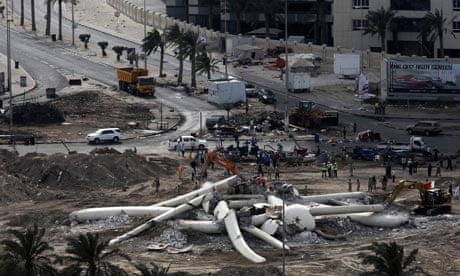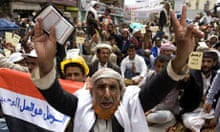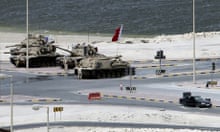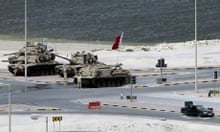The hub of Bahrain's rebellion was destroyed as the country's embattled leaders intensified moves to crush an implacable reformist movement rippling through the Gulf states.
The giant white monument in the middle of Pearl Roundabout was brought down during Friday afternoon and the mound of grass that had been home for most of the last six weeks to thousands of demonstrators is now a pile of brown dirt.
The destruction appeared to be part of a plan to revert central Manama to life before the two-month uprising, which has paralysed the kingdom and sharply destabilised its neighbours, two of which, Saudi Arabia and UAE, have deployed troops in an attempt to quell the revolt.
The three-hour demolition was carried out as two demonstrators shot earlier in the week during clashes with police were buried in villages on the outskirts of the capital. By the time word had spread of the roundabout's destruction, a curfew made it difficult for protesters to move on the site.
The move was described by demonstrators as an attempt to symbolically cleanse the city of the main focal point of Bahrain's most sustained reformist movement in 20 years.
"It won't work though," said one man walking briskly through a central city street as sunset approached. "Symbolism means nothing. We have the momentum."
However, as the body of Ahmed Farhan, who was shot in the head on Tuesday, was being prepared for burial in the restive enclave of Sitra, some mourners envied the momentum with rebels in Libya.
"There is a double standard with the Americans," said Ali al-Akri, of the UN resolution to enforce a no-fly zone over Libya. "It suits their interests to go after Gaddafi now because the crimes he committed cannot be defended by anyone.
"Here, because of the strong support they have always had for the kingdom, they don't want any radical change. They know that any change here will reflect on Saudi Arabia, which is deeply worried."
As hundreds of men chanted anti-regime slogans, Fadhil Radhi, 45, stepped forward. "I have a message for Obama," he said. "He asked for change and change took him to the top. But since then he has given these people (Bahrain's ruling al-Khalifa family) the green light.
"The people know the truth now, it is not like before. They cannot hide things, the media is strong and it reveals their lies. Obama knows it too and he has to show us what change means."
Masked Saudi troops, discernible by their accents, stood alongside the Bahraini army manning approaches to one of the city's main hospitals, the Salmaniya medical clinic, which remained under blockade, with doctors now living in wards and all but patients and their families prevented from entering.
In Riyadh King Abdullah, who pushed intensively for the hardline stance shown this week by Bahrain's leaders, pledged reforms in his kingdom as well as billions of dollars in grants to citizens.
He is also expected to announce a cabinet reshuffle in a further attempt to ward of dissent.
In a sign of unease elsewhere in the region, Kuwait dispatched several navy ships to patrol the waters off Bahrain and Qatar said it would not rule out also sending troops to the streets of Manama.
"This is all because we are asking for our rights," said Issa Mansour, whose son, Dr Ali al Akri, was arrested on Thursday, along with six other opposition figures as well as several prominent journalists and bloggers.
"They're killing us and arresting us because of that. There are 25 islands in Bahrain and all of them belong to the ruling family. We cannot buy land, we cannot get building approvals. The mercenaries they bring in and give nationality to can do all of this easily. But we, the original Bahrainis, can't."
Syria unrest
At least three people were killed in Syria as security forces scrambled to restore order after peaceful protests in several towns and cities.
Three protesters, named as Hussam Abdel Wali Ayyash, Akram Jawabreh and Ayhem al-Hariri, were killed in the southern city of Deraa, according to one resident. "The confrontations are ongoing. They are heavy," the resident told Reuters.
The demonstrations amounted to Syria's gravest unrest in years. State television said some "infiltrators" in Deraa caused "chaos and riots" and smashed cars and property before they were chased off by riot police. It said a similar demonstration in the coastal town of Banyas was dispersed without incident.
Amateur footage on YouTube and Twitter showed large groups of protesters in several cities throughout Syria, but its authenticity could not be confirmed. One amateur video appeared to be show Syrian government trucks spraying water on marchers. Two others purport to show several thousand men gathering in the cities of Homs and Baniyas.
Activists in the capital, Damascus, said plainclothes security officers forcefully dispersed about a dozen protesters who were calling for more freedoms.
pay rises, cash, loans and apartments in what appeared to be the Arab world's most expensive attempt to appease the unrest that has swept two leaders from power. He also announced the creation of 60,000 security force jobs, a move that would employ huge numbers of otherwise jobless young men, while bolstering his kingdom's ability to snuff out protests.
The ailing 86-year-old king, his soft voice trembling, rarely looked up from his notes in the speech, broadcast live on Saudi television.
The sweeteners include an additional two months' wages for all government workers and two extra pension payments for university students. He raised the monthly minimum wage to £500, with a monthly payment of about £160 to the country's unemployed. The king also set aside about £43bn to build 500,000 low-income apartments. Agencies






